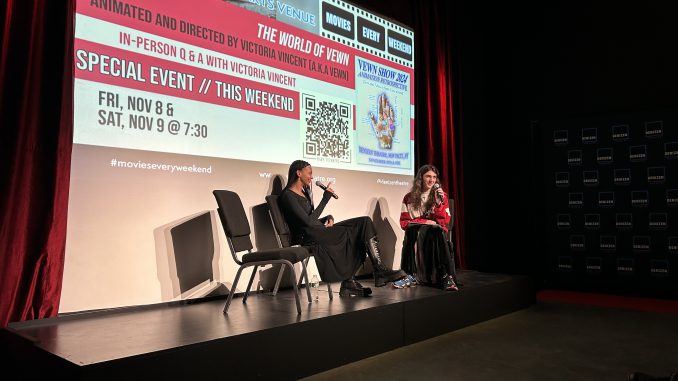
“Every time I draw a frame, I lose a friend.” This was the resounding mantra of an unforgettable evening of a one-man animation operation.
On Nov. 8 and 9, the Denizen Theatre welcomed Los Angeles-based YouTube animator and filmmaker, Victoria Vincent, better known as “Vewn” online, to showcase her animated films and participate in a live Q&A session with the audience. This screening was called “World of Vewn: Animation Retrospective and Live Q&A.”
The Friday evening began at 7:30 p.m., when an audience of over 70 attendees watched a screening of all of Vincent’s animation films and projects, featured films from her personal channel, hidden works and other collaborative projects spanning across eight years. After a brief interlude, Vincent came back out on stage to be interviewed by a Denizen Theatre employee, preceding the audience Q&A panel.
Vincent published her first animation, “pizza movie,” on Oct. 12, 2016, just over one year since the launch of her channel in September 2015. Since then, she has published 22 animations to YouTube, amassing 1.48 million subscribers and over 87 million views on the platform. Some of her most popular animations include “Bobo the Monkey,” “dead end,” “Twins in Paradise” and “cat city,” each garnering millions of views.
Vincent’s highly-distinct, abstract, chaotic art style allows her to explore topics surrounding mental health, identity and the current media-scape. Between eclectic color palettes and anarchic line boils, the avant-garde animation style Vincent employs is driven by her own personal stance against the polished, something she originally tried during college to minimal self-satisfaction. “I was trying to make something that felt very polished, which just isn’t me. It’s not my personality,” Vincent recalled. “pizza movie” was the first animation that truly “had [her] voice,” which became a central driving force of her future projects.
Creating an animated film starts with a moment, a singular idea — for Vincent, this can mean creating an entire work around one interesting moment. For example, “Twins in Paradise,” according to Vincent, spurred from the ending, when “[the twins] are hugging each other as the nuke falls.” From that vision, the animator was able to build the rest of the short film. It is through this process that the meaning behind the piece is uncovered. “I found that when you just have that thing that’s really compelling, it will tell you what it means as you make it.”
Many of her animations star animals or animal-figures in precarious human positions. Vincent does this to “[have] that dimension of abstraction that automatically adds humor and levity.” Vincent continued to say that this way, telling the story and landing the emotional beats becomes much easier and allows for the audience to better connect with what they’re being presented.
Along with animals, masks and costumes are another way Vincent explores one of her more familiar themes of identity. “Hiding your identity, being unable to see other people’s identity and really identifying with this false identity,” is just one of the approaches she takes when exploring something as multifaceted and complex as identity. These ideas are reflected predominantly in scenes evoking the digital space, which Vincent is no stranger to approaching and tackling head-on.
To her, the modern mediascape has “hurt everyone in the world, but it’s also not something we can stop. It’s something we just have to embrace and learn to live in.” For characters in her projects who fall victim to these vicious trials of the online sphere, Vincent said, “The way to win is to come together in real life, which I think would be my message to the world.”
The Denizen Theatre’s inspiration to showcase the animator is credited to Myles Flusser, the theater’s projectionist. His inspiration came from thinking of ways to “use this space, reach out to artists, who maybe are younger, who have a popular following on social media but maybe haven’t been given the traditional movie theater screening experience.” Flusser contacted Vincent around late summer, arranging this panel and having Vincent fly out from California to attend. This is the first retrospective showcase and Q&A she has ever done.
Speaking to the overall goals of panels like this and the Denizen Theatre’s mission, Flusser said, “We’re trying to think of ways that we can find that specific value that only a movie theater can provide, bringing a collective community together — giving people opportunities in the theater that they can’t find just online or in another place.”
Vincent has also worked on projects such as “We The People,” a Netflix childrens’ civic educational series and “Mask Dog,” a short animation created for Adult Swim. During the showcase, audiences were shown the unaired pilot of “Dirt Girls,” an animation series picked up by Fox in 2021, which is set to be produced by Vincent and animated by Bento Box Entertainment. No update was given since then by Fox, but Vincent confirmed the series was later canceled. In addition to her animation projects, Vincent also creates prints that she sells along with t-shirts, hoodies, hats and other limited-edition merchandise.
Many audience members shared that they were young artists themselves, navigating an ever-changing world with much uncertainty of what the climate will look like in the years to come. But if Vincent could give her younger self some advice, she said, “It just doesn’t matter if you make something bad. Like, literally it doesn’t matter. You’re gonna die someday, either way … it doesn’t matter. Just make it. Don’t be scared.”
